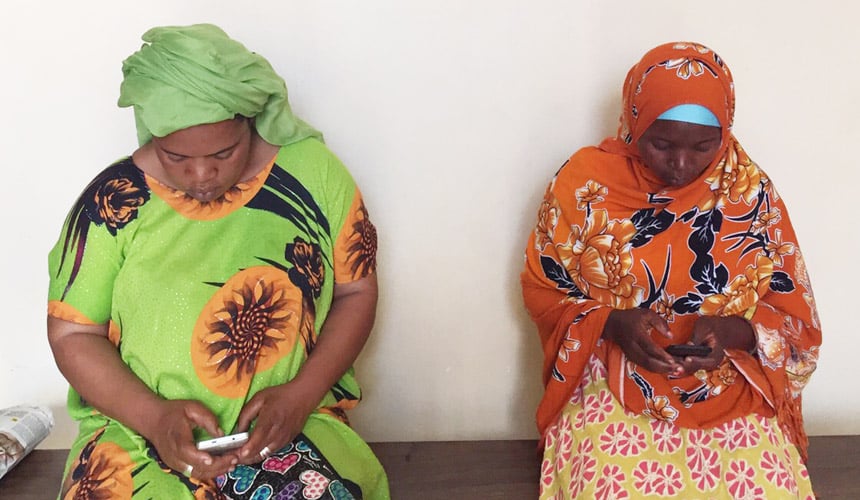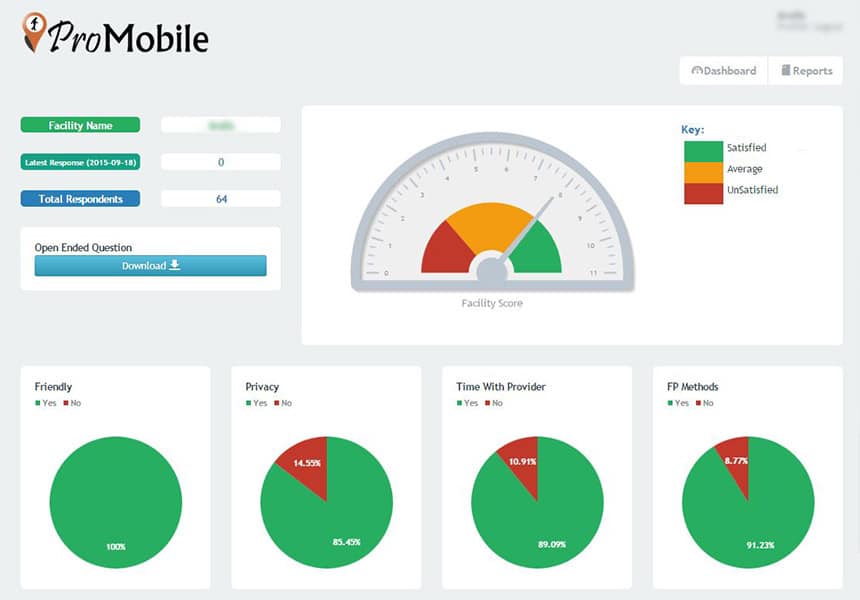The Problem
As part of its Family Planning 2020 goals, Tanzania committed to achieving a contraceptive prevalence rate of 60 percent by 2015. However, the country faces significant challenges in achieving this goal, with a contraceptive prevalence rate of 30 percent in 2014. Research suggests that improving the quality of family planning services can increase initiation and continuation of contraceptive use. To provide high quality family planning care, providers must respect and understand clients’ needs and concerns. Unfortunately, information about client perceptions of care is scarce in Tanzania; data collection efforts are typically one-off activities that do not provide a real-time understanding of client needs. Equally rare are mechanisms for translating that data into action; most facility-led quality improvement efforts do not systematically address client feedback on service delivery.
The Solution
FHI 360 aims to enable clients to provide feedback on the care they receive and motivate health facilities to respond to that input. The project sought to improve provider accountability by (1) offering clients the opportunity to rate services through a text messaging-based survey, (2) encouraging providers to focus on client needs and rights, and (3) promoting integration of client feedback into quality improvement initiatives. Through these efforts, the project hopes to educate men and women of reproductive age about quality standards for family planning services and help them feel comfortable asserting their rights and requesting that standards be upheld, leading to greater satisfaction with care. An informed, empowered, and satisfied clientele, combined with facilities that are committed and better-equipped to make client-centered quality improvements, are expected to increase the use of family planning services.

The Strategy
- Develop and administer a short mobile phone-based client feedback survey. FHI 360 developed a 10-question survey for individuals who recently visited a facility for family planning services. The survey, which is informed by evidence-based quality frameworks and the Tanzanian Family Planning Guidelines and Standards, covers a variety of quality-of-care domains, such as length of wait time, privacy, respect, and comprehensiveness of information provided. BongoLive, a technology service provider, converted the survey for transmission via text messaging, and providers at six partner facilities promoted the mobile “Sema Nasi” platform through posters and palm cards during client visits. Clients who wanted to provide feedback could text the keyword “Sema” to a specific phone number and receive the questionnaire to complete and submit anonymously via text message. Participation was free; FHI 360 reimbursed respondents by transferring airtime to their phones.
- Create an online dashboard to track facility performance. FHI 360 and BongoLive developed project-wide and facility-specific online dashboards that automatically synthesize data and generate facility scores and ratings on individual quality dimensions. Facilities can log into their dashboards to review this information.
- Develop service delivery improvement plans. FHI 360 visited facilities to share and discuss results from the survey, and provide guidance on how to use client feedback data to develop quality improvement plans.
Achievements
Objective client feedback was obtained through an on-demand, low-burden, mobile-phone-based data collection system. Clients were able to complete the survey independently instead of having providers administer it—a strategy that increased data confidentiality and reliability and minimized staff burden—but also ran the risk of low response rates. Ultimately, this approach was effective in reaching clients, who were responsive to the advertisements and filled out the survey on their own after their visit.
A streamlined online dashboard allows facilities to track performance in real time. The dashboard produces easy-to-understand data visualizations that help staff quickly absorb key findings on quality of care. This increases the likelihood that facilities will use the dashboard and act on client feedback. All partner facilities have developed quality improvement plans based on the data gathered so far. FHI 360 will track the extent to which these plans are implemented.
The Tanzanian government has expressed interest in participating. Given the short timeframe of the project, FHI 360 had originally intended to work only with private-sector facilities run by partners with which it had existing relationships. However, the Tanzanian government learned about the effort and asked for one public-sector facility to be included, issuing a directive to that facility to ensure its participation.
Challenges
Initial survey response rates were relatively low. At the start of the project, family planning clients were not always made aware of the opportunity to submit feedback. Those that did receive this information were often unclear about how the feedback system worked. Many were also concerned that the text messaging costs of survey participation would not be reimbursed. FHI 360 addressed these issues by encouraging providers to intensify promotion efforts, and training them on how to explain more clearly the mechanics of the feedback system and reimbursement process.
It was challenging to capture all key quality dimensions in a short text-message-based survey. Given length restrictions and cost per text message, FHI 360 had to limit the survey to 10 questions. Ensuring that all relevant aspects of quality of care were captured in these 10 questions was challenging. Ultimately, FHI 360 reviewed the literature to gain insight into which elements of quality clients valued most and selected the nine that were most frequently cited.
Developing the dashboard with non-health-sector partners was an iterative, multi-step process. The technology sector and the health sector communicate in different languages. As such, the project dashboard required multiple iterations and conversations before the partners had a shared understanding of how best to display the data.

Key Learnings
- Facilities are willing to have clients review their services, despite the risk of being rated poorly. Facility managers were supportive of
program goals, countering concerns that they might oppose assessments of their services. Providers were also willing to promote the platform but did not always do so consistently. They intensified their efforts after FHI 360 provided additional support and free airtime (which they could use to call the project team with questions). - Client feedback mechanisms can be more effective in facilities where there are existing quality improvement frameworks. To increase the likelihood of survey results being used to improve quality of care, FHI 360 selected partner facilities with an existing commitment to quality improvement. These facilities generally had supply-side-focused protocols in place for quality improvement, which could easily integrate a mechanism for soliciting and addressing client feedback.
- Poor internet connectivity can limit the extent to which facilities are able to use their dashboards. As expected, many facilities were unable to retrieve and use the client feedback information in their dashboards because they lacked internet access. Foreseeing this infrastructure challenge, FHI 360 built into its timeline a series of in-person meetings to discuss survey results with health facilities and promote the use of client feedback for quality improvement.
Facilities have really ended up getting behind the system. They have responded positively to the data and acknowledged its usefulness over time.
—Project staff member
Next Steps
FHI 360 aims to leverage the government’s interest in this effort to promote scale-up of the Sema Nasi platform in the public sector. It also hopes eventually to collect data on the quality of all facility-level services; facilities may be more responsive to overall quality scores.
Implementing Partners
Location
Tanzania—Dar es Salaam
Categories
Family Planning
Year Awarded
2013
Project Timeline
July 11, 2014 – July 12, 2015
About the Grantee and Partners
FHI 360 is a nonprofit human development organization that aims to advance integrated, locally driven solutions to development challenges through research, dialogue, and capacity building of governments, communities, civil society, and the private sector. In Tanzania, FHI 360 has conducted a variety of mHealth projects and is a key partner to the government on family planning—leading strategic initiatives and providing technical assistance.
BongoLive is a mobile services company based in Dar es Salaam, Tanzania, providing a range of mobile and text messaging services that empower businesses, nongovernmental organizations, governments, and consumers.
Download the Case Study